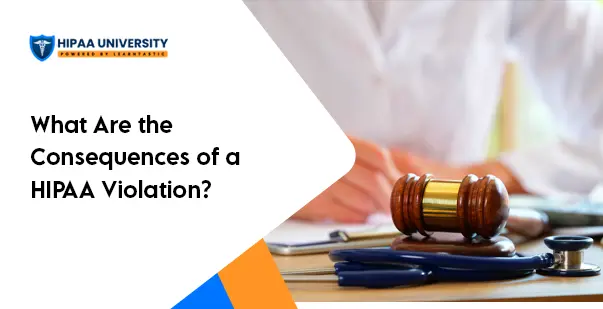What Are the Consequences of a HIPAA Violation?

September 2, 2024
Violating HIPAA can lead to serious consequences, and in healthcare, that risk is growing fast. As more systems move online, data breaches have become increasingly common—between 2019 and 2020 alone, nearly 35 million people had their personal health information exposed.
That’s why HIPAA, or the Health Insurance Portability and Accountability Act, exists in the first place. It’s designed to protect the relationship between patients and healthcare providers by keeping sensitive data private and secure.
But what happens when an organization fails to follow HIPAA rules? From data mishandling to missed security checks, violations can disrupt operations, trigger legal action, and damage public trust.
In this guide, we’ll take a closer look at what causes HIPAA violations, what the penalties are, and—most importantly—how to avoid them.
What Is HIPAA Training?
HIPAA training is a crucial part of working in healthcare. It helps ensure that everyone—whether they’re doctors, nurses, admin staff, or IT teams—understands how to protect patient privacy and follow HIPAA rules.
The goal of HIPAA training is to give employees the tools they need to handle sensitive information the right way. That includes knowing how to store and share data, how to keep it secure, and what to do if something goes wrong.
When done right, HIPAA training creates awareness across the organization. It teaches people their responsibilities when it comes to protecting patient data, builds habits around confidentiality, and keeps everyone up to date with changing regulations.
When Do HIPAA Violations Happen?
HIPAA violations usually occur when organizations fail to follow the privacy and security rules laid out by federal law. Most often, it involves mishandling a patient’s Protected Health Information (PHI)—things like medical records, billing details, or personal data.
These violations can happen for a number of reasons. Sometimes it’s a simple mistake, like accessing a file without permission or forgetting to log out of a computer. Other times, it’s a lack of proper training, outdated systems, or poor monitoring that leads to the issue.
HIPAA violations are often uncovered in different ways. In some cases, an internal employee might raise a red flag. In others, the Office for Civil Rights (OCR) may uncover issues during a routine audit or after a complaint is filed. Once a violation is suspected, it’s investigated carefully, and if the organization is found at fault, steps must be taken to fix the problem.
In the end, any weakness in how an organization protects PHI—whether intentional or accidental—can lead to a violation and serious consequences.
Category of HIPAA Violations
HIPAA violations can fall into several key categories. Some of the most common include:
Lack of HIPAA training: Every employee needs proper compliance training—and records to prove it. Without this, an organization risks a serious violation.
Skipping risk analysis: All healthcare organizations are expected to regularly assess their systems for potential weaknesses. Without this step, it’s hard to prevent or respond to breaches.
Improper handling of medical records: Leaving charts out or screens unlocked can expose private data. Using secure digital systems and screen locks goes a long way in protecting patient information.
Using unencrypted tech to send PHI: Sharing sensitive data over unsecured platforms is a clear HIPAA violation. Encryption is not optional—it’s essential.
Not addressing cyber threats: With cyberattacks on the rise, organizations must actively defend their systems. Ignoring digital security puts PHI at serious risk.
Sharing records without permission: Employees must be trained to always get written consent before sharing patient data—even for billing or treatment. Skipping this step can lead to compliance trouble.
🔗 Read More: Who Must Comply with HIPAA Rules and Regulations?
Consequences of HIPAA Violation
When HIPAA is violated, the damage goes beyond just breaking a rule—it often hits a healthcare organization where it hurts most: its reputation and the trust it holds with patients.
Imagine being the one to tell your patients that their private information has been exposed. It’s a difficult conversation and one that often leads people to find a new provider—one they believe will keep their data safe.
But it’s not just about trust. HIPAA violations also carry legal and financial consequences. Depending on the nature of the violation, an organization might face lawsuits, regulatory penalties, and mandatory changes to its internal systems and security measures.
Fines can be steep. They range anywhere from $100 to $60,000 per violation, and in serious cases, they can add up to millions of dollars. These penalties are based on factors like how many people were affected, the kind of violation that occurred, and how quickly the organization responded.
Real-Life Example
A major incident that highlights the serious consequences of a HIPAA violation is the case involving Premera Blue Cross. In 2020, the Office for Civil Rights (OCR) discovered that hackers had accessed the personal health data of around 10.4 million individuals.
The breach happened through a phishing email that installed malware on the company’s systems. That malware gave attackers access to electronic Protected Health Information (ePHI), and the breach went unnoticed for nearly nine months. After an investigation, the OCR cited “systemic noncompliance” with HIPAA rules.
The findings showed that Premera failed to perform an effective risk analysis and did not put proper safeguards in place to protect sensitive health data. As a result, the company agreed to pay $6.85 million to the U.S. Department of Health and Human Services (HHS) and committed to a corrective action plan to fix the compliance issues.
Civil and Criminal Penalties for HIPAA Violation
When someone violates HIPAA, the consequences can be serious—both in terms of money and potential jail time. The type of penalty depends on how severe the violation was and whether it was intentional.
Civil penalties are typically issued when an organization fails to comply but doesn’t act with malicious intent. The Office for Civil Rights (OCR) can issue fines if the problem isn’t corrected in time. The amount varies depending on the circumstances:
- If a violation occurred due to a reasonable cause, fines can range from $1,000 to $50,000. Repeat violations can push the total up to $100,000.
- If it’s a case of willful neglect but the issue gets fixed, the fine might be $10,000 to $50,000 per violation, and up to $250,000 for repeated mistakes.
- If willful neglect goes uncorrected, the cost can be $50,000 per violation, with an annual cap of $1.5 million.
Criminal penalties are more severe and are handled by the Department of Justice. These apply when someone knowingly breaks HIPAA rules, especially for personal gain or with harmful intent:
- For knowingly obtaining or disclosing PHI, the penalty can be up to $50,000 and one year in jail.
- If it’s done under false pretenses, it increases to $100,000 and up to five years.
- For violations involving fraud, sale of data, or malicious harm, the consequences can reach $250,000 and up to 10 years in prison.
These penalties are a strong reminder that protecting patient data is not just good practice—it’s the law.
🔗 Read More: Complete HIPAA Compliance: IT Checklist, Security Rules & More
How to Avoid HIPAA Violations
Avoiding HIPAA violations isn’t just about following the rules—it’s about building trust with patients and protecting your organization from costly setbacks. A single mistake can damage your reputation and lead to major financial penalties. The good news? Most violations are preventable if you take the right steps.
Start with regular self-audits. These help you spot gaps in how your organization handles patient information. Look at everything—from how data is stored to who has access. Once vulnerabilities are identified, take action to close those gaps and prevent future risks.
Employee training is another must. A surprising number of breaches happen because staff simply aren’t aware of what’s allowed and what isn’t. Training should cover everything from how to protect electronic records to what to do if a device goes missing. Cybersecurity awareness should also be part of the program.
Business Associate Agreements (BAAs) are key if you work with third-party vendors who handle patient data. These legal agreements spell out how those partners will stay HIPAA compliant. Without a BAA, you’re exposed to major risks if something goes wrong on their end.
Taking these steps won’t just help you follow the law—they’ll also show patients and partners that you take their privacy seriously.
Protect Your Reputation: Preventing HIPAA Violations
The consequences of violating HIPAA aren’t just legal—they’re personal. When patients find out their data was mishandled, the damage to your organization’s reputation can be immediate and long-lasting. That kind of breach of trust is hard to come back from.
That’s why prevention is everything. The steps you take today—like staff training, risk assessments, and securing your systems—can protect you from costly penalties and public fallout down the line.
And it’s not just about compliance. It’s about showing patients, partners, and regulators that your organization values privacy and takes data protection seriously. Because in healthcare, trust isn’t just important—it’s essential.





